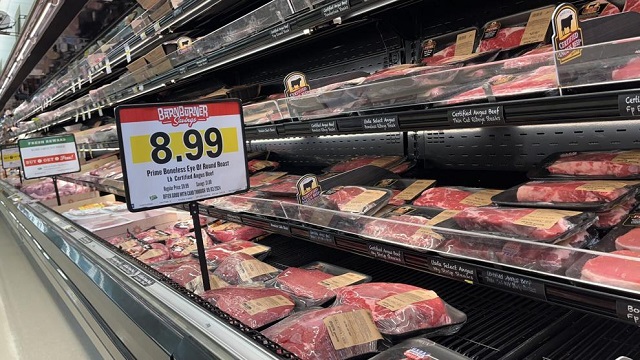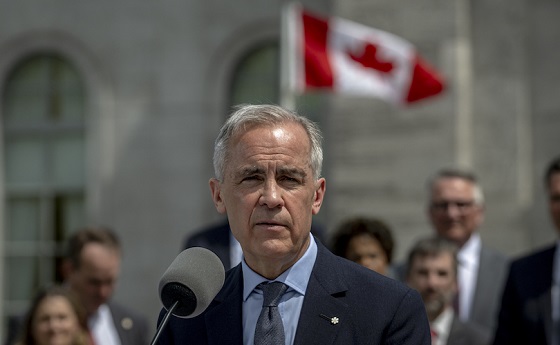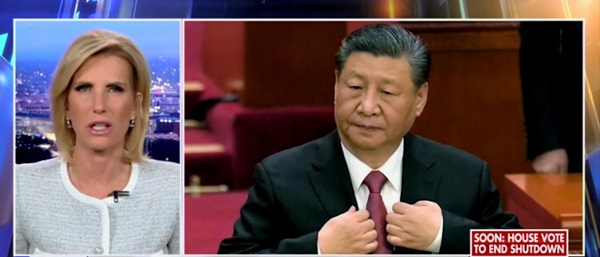Business
FACT CHECK: Who’s to blame for high grocery, energy, other costs?

From The Center Square
By
With inflationary costs reaching a 40-year high under the Biden-Harris administration, President Joe Biden, Vice President Kamala Harris and others in their administration have repeatedly blamed businesses, livestock producers, grocery stores, oil and natural gas companies and others for high prices.
At the same time, a record number of businesses closed, declared bankruptcy and laid off hundreds of thousands of workers, citing high inflationary costs. In a recent report, nearly half of all small businesses said they won’t survive a second Harris term, higher costs and increased taxes, The Center Square reported.
Despite this, Harris says she plans to implement price controls, increase taxes on businesses and allow the 2017 tax cuts to expire, creating a $6 trillion chasm between her plan and former President Donald Trump’s, the Wall Street Journal reported.
As Americans struggled with increased grocery costs, including the high cost of meat, producers were faced with higher fuel, feed, grain and hay costs, driving up their operational costs that were passed onto consumers, according to multiple reports. In response, in 2021, the White House National Economic Council blamed high meat prices on “dominant corporations in uncompetitive markets taking advantage of their market power.”
The U.S. Chamber of Commerce disagrees, arguing that market concentration in the meat packing industry had been virtually unchanged for 25 years at the time. It then asked “if high prices are the result of corporate greed, why did these ‘greedy’ companies wait two decades to raise prices?” It clarified that increased meat prices were driven by supply and demand and overall inflation, largely created by increased federal spending and debt.
With costs increasing across the board, some companies adjusted by selling less product for more, referred to as shrinkflation, The Center Square first reported in 2022. However, Biden and Harris blamed companies for higher costs, reportedly in response to Democratic operatives advising them to do so, The Washington Post reported.
“What we said is, ‘You need a villain or an explanation for this. If you don’t provide one, voters will fill one in. The right is providing an explanation, which is that you’re spending too much,’” one Democratic operative told the Post. “That point finally became convincing to people in the White House.”
“And thus began the effort to wrongly blame employers for high prices,” the chamber’s executive vice president Neil Bradley said in a report identifying examples of the White House “wrongly blaming businesses for high prices.”
Also in 2022, Biden publicly blamed container companies for high shipping costs. News reports pointed to supply chain issues impacted by worker shortages, changes in customer spending that resulted in more cargo arriving in ports that the ports couldn’t handle, and port fines and fees contributing to higher costs.
The chamber notes that increased prices “resulted from consumers shifting their spending from services to goods” during the COVID-lockdown era, causing increased cargo demand. “Increased demand created backlogs at the ports, raising prices even higher. As supply and demand normalized, prices fell.”
By 2023, the president again publicly blamed the U.S. oil and natural gas industry for gas prices reaching a seven-year high. This was after he took more than 200 actions against the U.S. oil and natural gas industry, U.S. House Democrats introduced a bill that would have added a 50% per barrel tax, and the U.S. Treasury Department proposed a $110 billion tax hike on the industry, The Center Square reported.
But the industry doesn’t control the market, it’s subject to it like everyone else, Texas Independent Producers & Royalty Owners Association President Ed Longanecker said. The Biden-Harris administration could have lowered costs by expediting permits, lifting the federal leasing ban and creating “a more stable regulatory environment that provides certainty to producers and investors,” he told The Center Square. “Overburdensome regulations, increased taxes and anti-oil and natural gas rhetoric” exacerbated high energy prices and raised consumer costs, he said.
The administration has also repeatedly sued the industry and Texas, which leads U.S. production, exports and energy creation. In response, Texas Gov. Greg Abbott has aggressively fought to protect the Texas industry from Biden policies, the governor argues.
Also in 2023, the chair of Biden’s Council of Economic Advisers said grocery sector profit margins “were elevated” and needed to “pass-through” to consumers. Earlier this year, Biden again claimed, “there are still too many corporations in America ripping people off: price gouging, junk fees, greedflation, shrinkflation.”
The chamber refutes these claims, pointing to federal data, arguing that “higher grocery prices are a result of inflationary pressure across the supply chain and basic supply and demand dynamics,” explained by Department of Agriculture and Government Accountability Office economists.
Biden and Harris blaming businesses for high prices is “entirely backward,” Bradley says. “The truth is the Administration’s own fiscal and regulatory policies are driving inflation, and the American consumer is left holding the bag.”
Business
Parliamentary Budget Officer begs Carney to cut back on spending

PBO slices through Carney’s creative accounting
The Canadian Taxpayers Federation is calling on Prime Minister Mark Carney to cut spending following today’s bombshell Parliamentary Budget Officer report that criticizes the government’s definition of capital spending and promise to balance the operating budget.
“The reality is that Carney is continuing on a course of unaffordable borrowing and the PBO report shows government messaging about ‘balancing the operating budget’ is not credible,” said Franco Terrazzano, CTF Federal Director. “Carney is using creative accounting to hide the spiralling debt.”
Carney’s Budget 2025 splits the budget into operating and capital spending and promises to balance the operating budget by 2028-29.
However, today’s PBO budget report states that Carney’s definition of capital spending is “overly expansive.” Without using that “overly expansive” definition of capital spending, the government would run an $18 billion operating deficit in 2028-29, according to the PBO.
“Based on our definition, capital investments would total $217.3 billion over 2024-25 to 2029-30, which is approximately 30 per cent ($94 billion) lower compared to Budget 2025,” according to the PBO. “Moreover, based on our definition, the operating balance in Budget 2025 would remain in a deficit position over 2024-25 to 2029-30.”
The PBO states that the Carney government is using “a definition of capital investment that expands beyond the current treatment in the Public Accounts and international practice.” The report specifically points out that “by including corporate income tax expenditures, investment tax credits and operating (production) subsidies, the framework blends policy measures with capital formation.”
The federal government plans to borrow about $80 billion this year, according to Budget 2025. Carney has no plan stop borrowing money and balance the budget. Debt interest charges will cost taxpayers $55.6 billion this year, which is more than the federal government will send to the provinces in health transfers ($54.7 billion) or collect through the GST ($54.4 billion).
“Carney isn’t balancing anything when he borrows tens of billions of dollars every year,” Terrazzano said. “Instead of applying creative accounting to the budget numbers, Carney needs to cut spending and debt.”
Business
Carney government needs stronger ‘fiscal anchors’ and greater accountability

From the Fraser Institute
By Tegan Hill and Grady Munro
Following the recent release of the Carney government’s first budget, Fitch Ratings (one of the big three global credit rating agencies) issued a warning that the “persistent fiscal expansion” outlined in the budget—characterized by high levels of spending, borrowing and debt accumulation—will erode the health of Canada’s finances and could lead to a downgrade in Canada’s credit rating.
Here’s why this matters. Canada’s credit rating impacts the federal government’s cost of borrowing money. If the government’s rating gets downgraded—meaning Canadian federal debt is viewed as an increasingly risky investment due to fiscal mismanagement—it will likely become more expensive for the government to borrow money, which ultimately costs taxpayers.
The cost of borrowing (i.e. the interest paid on government debt) is a significant part of the overall budget. This year, the federal government will spend a projected $55.6 billion on debt interest, which is more than one in every 10 dollars of federal revenue, and more than the government will spend on health-care transfers to the provinces. By 2029/30, interest costs will rise to a projected $76.1 billion or more than one in every eight dollars of revenue. That’s taxpayer money unavailable for programs and services.
Again, if Canada’s credit rating gets downgraded, these costs will grow even larger.
To maintain a good credit rating, the government must prevent the deterioration of its finances. To do this, governments establish and follow “fiscal anchors,” which are fiscal guardrails meant to guide decisions regarding spending, taxes and borrowing.
Effective fiscal anchors ensure governments manage their finances so the debt burden remains sustainable for future generations. Anchors should be easily understood and broadly applied so that government cannot get creative with its accounting to only technically abide by the rule, but still give the government the flexibility to respond to changing circumstances. For example, a commonly-used rule by many countries (including Canada in the past) is a ceiling/target for debt as a share of the economy.
The Carney government’s budget establishes two new fiscal anchors: balancing the federal operating budget (which includes spending on day-to-day operations such as government employee compensation) by 2028/29, and maintaining a declining deficit-to-GDP ratio over the years to come, which means gradually reducing the size of the deficit relative to the economy. Unfortunately, these anchors will fail to keep federal finances from deteriorating.
For instance, the government’s plan to balance the “operating budget” is an example of creative accounting that won’t stop the government from borrowing money each year. Simply put, the government plans to split spending into two categories: “operating spending” and “capital investment” —which includes any spending or tax expenditures (e.g. credits and deductions) that relates to the production of an asset (e.g. machinery and equipment)—and will only balance operating spending against revenues. As a result, when the government balances its operating budget in 2028/29, it will still incur a projected deficit of $57.9 billion when spending on capital is included.
Similarly, the government’s plan to reduce the size of the annual deficit relative to the economy each year does little to prevent debt accumulation. This year’s deficit is expected to equal 2.5 per cent of the overall economy—which, since 2000, is the largest deficit (as a share of the economy) outside of those run during the 2008/09 financial crisis and the pandemic. By measuring its progress off of this inflated baseline, the government will technically abide by its anchor even as it runs relatively large deficits each and every year.
Moreover, according to the budget, total federal debt will grow faster than the economy, rising from a projected 73.9 per cent of GDP in 2025/26 to 79.0 per cent by 2029/30, reaching a staggering $2.9 trillion that year. Simply put, even the government’s own fiscal plan shows that its fiscal anchors are unable to prevent an unsustainable rise in government debt. And that’s assuming the government can even stick to these anchors—which, according to a new report by the Parliamentary Budget Officer, is highly unlikely.
Unfortunately, a federal government that can’t stick to its own fiscal anchors is nothing new. The Trudeau government made a habit of abandoning its fiscal anchors whenever the going got tough. Indeed, Fitch Ratings highlighted this poor track record as yet another reason to expect federal finances to continue deteriorating, and why a credit downgrade may be on the horizon. Again, should that happen, Canadian taxpayers will pay the price.
Much is riding on the Carney government’s ability to restore Canada’s credibility as a responsible fiscal manager. To do this, it must implement stronger fiscal rules than those presented in the budget, and remain accountable to those rules even when it’s challenging.
-

 Daily Caller2 days ago
Daily Caller2 days agoLaura Ingraham’s Viral Clash With Trump Prompts Her To Tell Real Reasons China Sends Students To US
-

 Frontier Centre for Public Policy1 day ago
Frontier Centre for Public Policy1 day agoRichmond Mayor Warns Property Owners That The Cowichan Case Puts Their Titles At Risk
-

 armed forces2 days ago
armed forces2 days agoCanadian veteran says she knows at least 20 service members who were offered euthanasia
-

 Business1 day ago
Business1 day agoSluggish homebuilding will have far-reaching effects on Canada’s economy
-

 Business1 day ago
Business1 day agoMark Carney Seeks to Replace Fiscal Watchdog with Loyal Lapdog
-

 National2 days ago
National2 days agoConservative bill would increase penalties for attacks on places of worship in Canada
-

 Censorship Industrial Complex18 hours ago
Censorship Industrial Complex18 hours agoEU’s “Democracy Shield” Centralizes Control Over Online Speech
-

 Alberta2 days ago
Alberta2 days agoHow economic corridors could shape a stronger Canadian future










